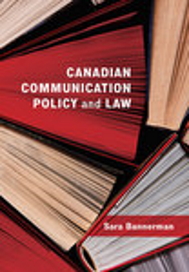Canadian Communication Policy and Law
By Sara Bannerman
Overview

Canadian Communication Policy and Law provides a uniquely Canadian focus and perspective on telecommunications policy, broadcasting policy, internet regulation, freedom of expression, censorship, defamation, privacy, government surveillance, intellectual property, and more. Taking a critical stance, Sara Bannerman draws attention to unequal power structures by asking the question, whom does Canadian communication policy and law serve?
Key theories for analysis of law and policy issues—such as pluralist, libertarian, critical political economy, Marxist, feminist, queer, critical race, critical disability, postcolonial, and intersectional theories—are discussed in detail in this accessibly written text. From critical and theoretical analysis to legal research and citation skills, Canadian Communication Policy and Law encourages deep analytic engagement. Serving as a valuable resource for students who are undertaking research and writing on legal topics for the first time, this comprehensive text is well suited for undergraduate communication and media studies programs.
Publisher website: this book is available for purchase as an e-book (PDF or epub via VitalSource) or hard copy .
This book is available for purchase (price at last check: $24.46 USD) or rental with 90-day to 1-year rental periods ($13.98-22.72 USD at last check) via Redshelf.
Available via some libraries through ProQuest.
Instructor resources available on the publisher website.
Table of Contents
Introduction
Chapter 1: Whom Do Law and Policy Serve?
Chapter 2: Introduction to the Canadian Legal System
Chapter 3: Freedom of Expression and Censorship
Chapter 4: Defamation
Chapter 5: Privacy
Chapter 6: Government Surveillance
Chapter 7: Intellectual Property
Chapter 8: Telecommunications Regulation
Chapter 9: Broadcasting Regulation
Chapter 10: Internet Regulation
Chapter 11: Access to Information
Chapter 12: Legal and Policy Research and Citation
Conclusion
Glossary
List of Acronyms
Bibliography
Index
